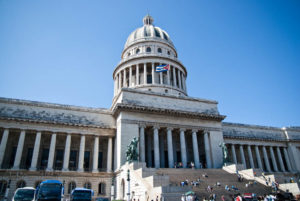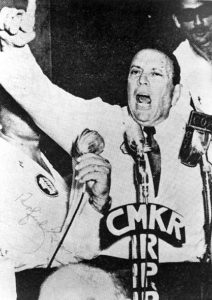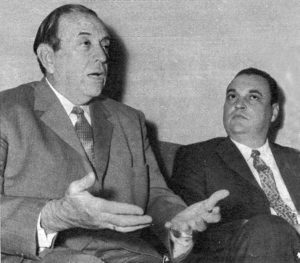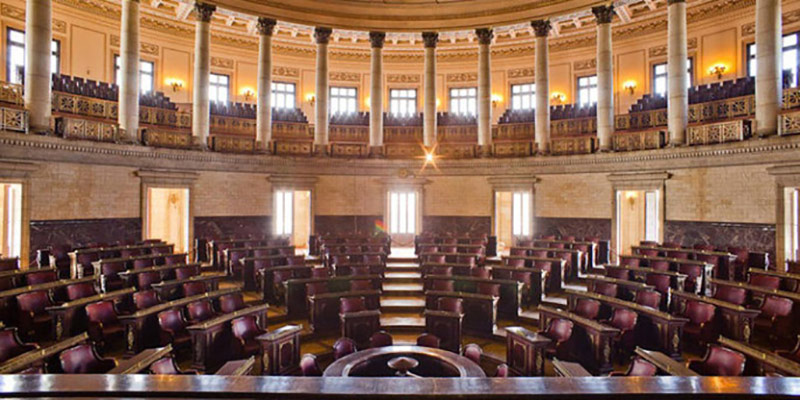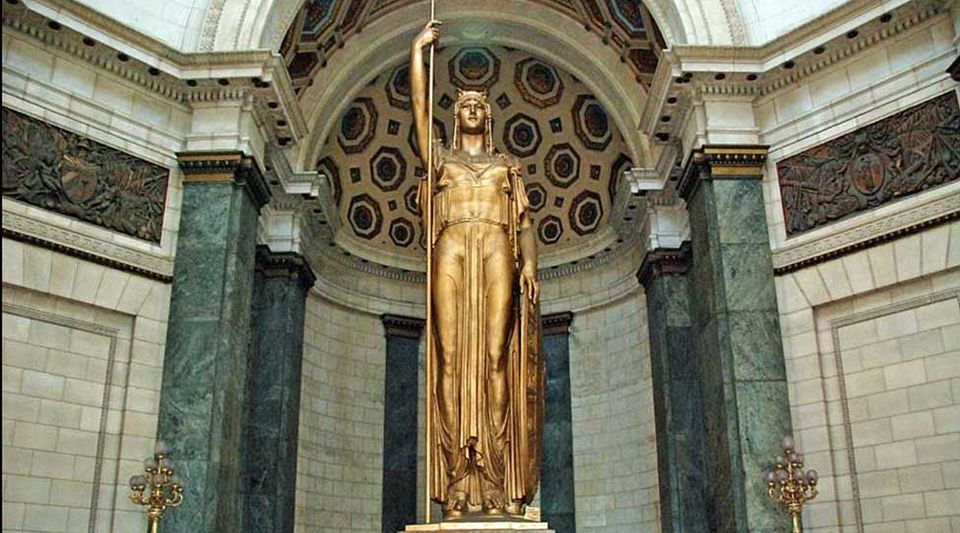Recalling a bit of history of our old and beloved Republic let’s talk about one of his most colorful and politically prepared characters in the Cuban electoral process, we refer to Rafael Guas Inclán, who became Vice President of Cuba and who gave support at the time to the dictator Gerardo Machado who fell defeated on August 12, 1933.
Guas went into exile and when he returned, three or four years later, he reinserted himself in public life as if nothing had happened. To those who reproached him for his return to politics despite his Machado’s past, he answered:
-Caramba, I accompany my friends to the grave, but no one will pretend to put me in the hole with them.
It was, it is said, the man who gave more duels in republican Cuba. And he maintained the custom in Miami, where he ended up in January 1959, after having sought asylum in the Chilean embassy.
One day, already in Miami, he had to dismiss the duel of General Generoso Campos Marquetti. This subject was, in September 1900, the first black who had a judge appointment in the Island: in Batabanó, and later, in 1913, being already a Representative to the House, he won a sad celebrity when in that co-legislator body he opposed that a credit of 2,000 pesos be approved to buy toys for poor children.
Generous, which was not the generous that proclaimed his name, defended the view that this was not the responsibility of the House but of the municipalities, and the project was rejected. After the coup d’etat of March 10, 1952, he was part of the Consultative Council that supplanted Parliament.
The scribe can not establish where his military rank came from because he does not seem to have won it in the struggles for independence.
“Today we come here to say goodbye to General Generoso, the generous general and we will leave his body lying on the ground that held him lovingly,” said Guas before glossing the highlights of the biography of the deceased. The speaker was inspired even though the sky, overcast, presaged rain.
Good father, good husband … He extolled his way through the courts and defined him as a justice judge, and in the House, as a shrewd politician, and stressed that he assumed with pain the farewell of the friend and co-religionist.
At that point the annoying drizzle gathered strength, but Guas continued his tirade, imperturbable. “As of today, we will no longer pay you: you will not abandon us anymore, you do not disappear: you integrate into our lives more alive than before and stronger …”.
The downpour was already torrential. Even so, and savoring a phrase that he believed happy, the speaker added: “Today we mourn General Generoso, the generous general and the sky, with this inclement rain, he shares our pain and also cries it”.
Guas Inclán had his lawyer’s office in Calle Aguiar, on the corner of Muralla, in Old Havana. He was vice president of the Republic between 1954 and 1958, when he resigned to run for mayor of Havana. He won the election and had to take office on February 24, 1959, but the triumph of the Revolution deprived him of that possibility.
In those times, the City Hall of Havana, and not the vice president, was the second position of the Republic.
In Miami, at times, he cultivated the social chronicle, such as the one he wrote on the occasion of the wedding of Anselmo’s Alliegro son with the younger daughter of President Carlos Prío and that was published in the magazine Replica that Max Lesnik published in that city. Tremendous combination.
The review of the marriage of the son of a Batista politician with the daughter of an authentic politician written by a liberal politician to be published in the magazine of an orthodox politician. Turn off and let’s go!
CUBA: RECUERDOS Y CURIOSIDADES DE NUESTRA REPÚBLICA DEL AYER.
Recordando un poco de historia de nuestra vieja y querida Republica hablemos de uno de sus personajes mas coloridos y preparados politicamente en el proceso electoral cubano, nos referimos a Rafael Guas Inclán, quien llegó a ser Vice Presidente de Cuba y que dió en su momento apoyo al dictador Gerardo Machado que cayera derrotado el 12 de agosto de 1933.
Guas se fue al exilio y cuando regresó, tres o cuatro años después, se reinsertó en la vida pública como si nada hubiera sucedido. A los que le reprochaban su vuelta a la política pese a su pasado machadista, respondía:
—Caramba, yo acompaño a mis amigos hasta la tumba, pero nadie pretenderá que me meta en el hueco junto con ellos.
Fue, se dice, el hombre que más duelos despidió en la Cuba republicana. Y mantuvo la costumbre en Miami, a donde fue a parar en enero de 1959, luego de haber buscado asilo en la embajada de Chile.
Un día, ya en Miami, le tocó despedir el duelo del general Generoso Campos Marquetti. Este sujeto fue, en septiembre de 1900, el primer negro que tuvo en la Isla un nombramiento de juez: en Batabanó, y más tarde, en 1913, siendo ya Representante a la Cámara, ganó triste celebridad cuando en ese cuerpo colegislador se opuso a que se aprobase un crédito de 2 000 pesos para comprar juguetes a niños pobres.
Generoso, que no era lo generoso que pregonaba su nombre, defendió el criterio de que eso no era incumbencia de la Cámara sino de los ayuntamientos, y el proyecto fue rechazado. Tras el golpe de Estado del 10 de marzo de 1952 formó parte del Consejo Consultivo que suplantó al Parlamento.
No puede establecer el escribidor de dónde le venía su grado militar pues no parece haberlo ganado en las luchas por la independencia.
“Hoy venimos aquí a decir adiós al general Generoso, al generoso general y dejaremos su cuerpo tendido en la tierra que lo sostuvo amorosamente”, dijo Guas antes de glosar los puntos culminantes de la biografía del difunto. El orador estaba inspirado pese a que el cielo, encapotado, presagiaba lluvia.
Buen padre, buen marido… Ensalzó su paso por los tribunales y lo definió como un juez justiciero, y en la Cámara, como un político sagaz, y subrayó que asumía con dolor la despedida del amigo y correligionario.
A esa altura la molesta llovizna cobraba fuerzas, pero Guas continuaba su perorata, imperturbable. “A partir de hoy ya no te abonaremos: ya no nos abandonarás. No desapareces: te integras a nuestras vidas más vivo que antes y más fuerte…”.
El aguacero era ya torrencial. Aun así, y saboreando una frase que creyó feliz, añadió el orador: “Lloramos hoy al general Generoso, al generoso general y el cielo, con esta lluvia inclemente, comparte nuestro dolor y también lo llora”.
Guas Inclán tenía su bufete de abogado en la calle Aguiar esquina a Muralla, en La Habana Vieja. Fue vicepresidente de la República entre 1954 y 1958, cuando renunció para postularse como Alcalde de La Habana. Ganó la elección y debía tomar posesión el 24 de febrero de 1959, pero el triunfo de la Revolución lo privó de esa posibilidad.
En aquellos tiempos, la Alcaldía de La Habana, y no la vicepresidencia, era la segunda posición de la República.
En Miami, a veces, cultivaba la crónica social, como la que escribió en ocasión de la boda del hijo de Anselmo Alliegro con la hija menor del presidente Carlos Prío y que apareció publicada en la revista Réplica que Max Lesnik editaba en esa ciudad. Tremenda combinación.
La reseña del matrimonio del hijo de un político batistiano con la hija de un político auténtico escrita por un político liberal para ser publicada en la revista de un político ortodoxo. ¡Apaga y vamos!
Agencies/Rad.Habana/Ciro Bianchi/Internet Photos/Arnoldo Varona/ TheCubanHistory.com
THE CUBAN HISTORY, HOLLYWOOD.



 > CUBA: Memories and Curiosities of Our Old Republic. <> CUBA: Recuerdos y Curiosidades de Nuestra Republica del Ayer. (Photos).
> CUBA: Memories and Curiosities of Our Old Republic. <> CUBA: Recuerdos y Curiosidades de Nuestra Republica del Ayer. (Photos).